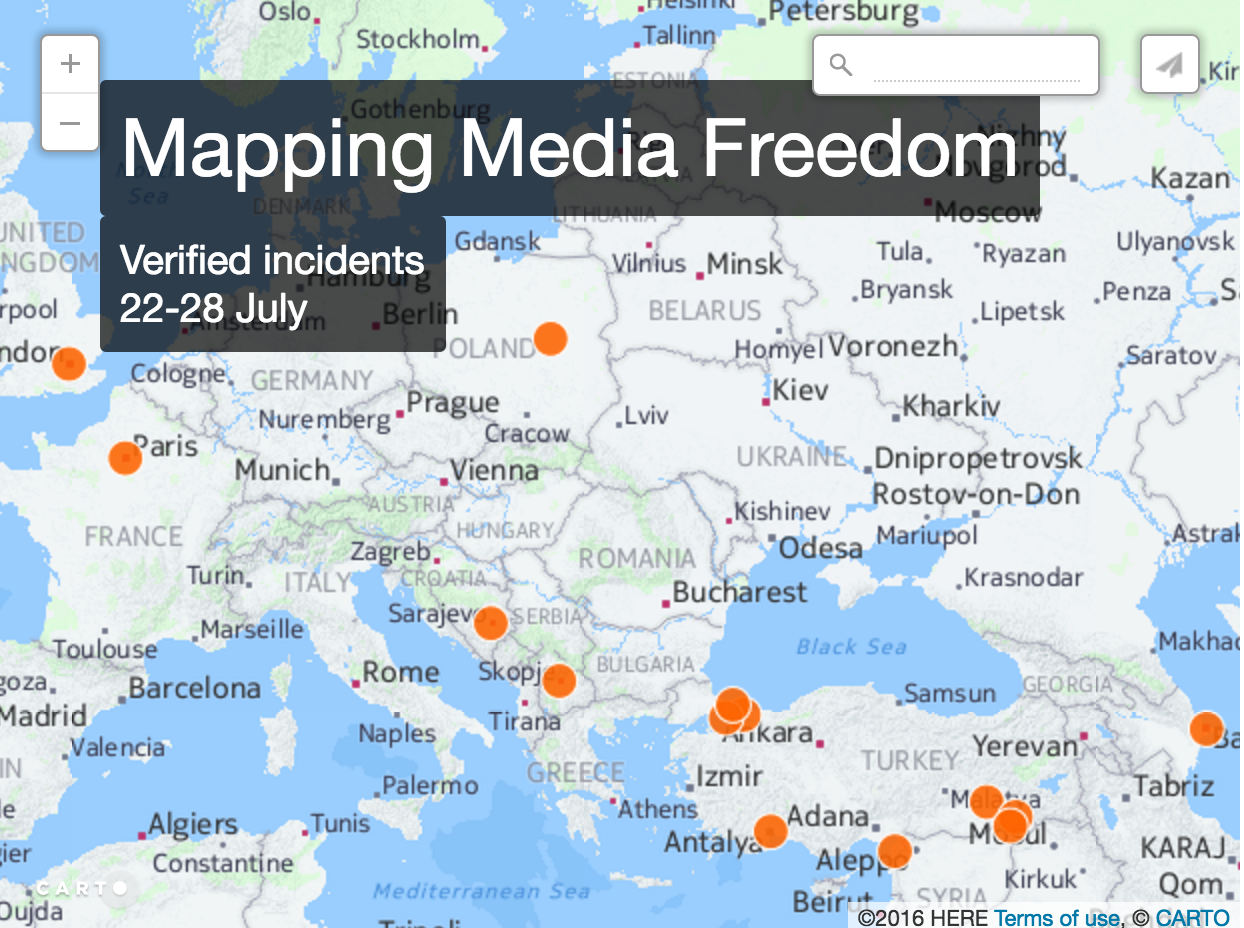Click on the dots for more information on the incidents.
Each week, Index on Censorship’s Mapping Media Freedom project verifies threats, violations and limitations faced by the media throughout the European Union and neighbouring countries. Here are five recent reports that give us cause for concern.
Turkey: Warrants issued for arrest of 89 journalists
Turkish authorities have issued two lists of journalists to be arrested since the 15 July failed military coup attempt in the country. Firstly, on 25 July, authorities issued the names of 42 journalists as part of an inquiry into the coup attempt. Well-known commentator and former parliamentarian Nazli Ilicak was among those for whom a warrant was issued, as was Ercan Gun, the head of news department at Fox TV in Turkey.
Two days later, 27 July, authorities issued warrants for the detention of 47 former executives or senior journalists of the newspaper Zaman. The arrests were part of a large-scale crackdown on suspected supporters of US-based Muslim cleric Fethullah Gulen, accused by Ankara of masterminding the failed coup. The authorities shut down Zaman in March. At least one journalist, former Zaman columnist Şahin Alpay, was detained at his home early on Wednesday.
Macedonia: Media publisher dismisses 20 employees from its publications
26 July, 2016 – Media Print Macedonia, the publisher of several daily and weekly newspapers, announced that it would dismiss 20 staff members, mostly experienced journalists and former editors from the daily Vest.
Layoffs are also to include employees from daily Utrinski Vesnik, Dnevnik, Makedonski Sport and weekly magazine Tea Moderna.
MPM stated layoffs were prompted by bad results and that the decision on who to dismiss would be based on the company’s internal procedures. Employees who lose heir jobs are to be compensated from one up to five average salaries, TV Nova reported.
Bosnia: Doctor insults journalist after article on private clinic
24 July, 2016 – Emir Talirevic, a doctor who owns Moja Klinika, a private healthcare institution in Sarajevo, used Facebook to insult Selma Ucanbarlic, a journalist for the Centre for Investigative Journalism, following her articles about Moja Klinika, regional TV outlet N1 reported.
On 24 July Talirevic wrote on Facebook, among other things, that “judging by her psycho-physical attributes [the journalist] should never be allowed to do more complex work than grilling a barbecue”. He alleged hers were “imbecilic findings”, adding that “her work requires higher IQ than 65”.
In a second post, published on 27 July, Talirevic wrote that “as the toilet tank is taking away my associations on Selma and her CIN(ical) website I am thinking about the oldest profession in the world – prostitution”. He also wrote: “CIN is financed by gifts, like prostitutes”, and “after today’s article at least we know for whom Selma Ucanbarlic and her CIN colleagues are spreading their legs”.
Poland: Journalist leaves public radio station speaking of repression and censorship
Masza Makarowa tłumaczy, dlaczego opuściła rosyjską redakcję Polskiego Radia https://t.co/eCsmqqSJQA ▶️ #TOKFM
— Radio TOK FM (@Radio_TOK_FM) July 23, 2016
22 July, 2016 – Masza Makarowa, a former journalist for the Russian language division of national broadcaster Polskie Radio, left the station due to a repressive climate and censorship, she claimed on her Facebook page.
An “atmosphere of scare tactics and paranoia” was prevalent at the broadcaster, Makarowa said. She also claimed that the station management instructed staff on which sources to consider for publication to Russian-speaking audiences, approving right-leaning, pro-governmental websites while explicitly prohibiting liberal sources like Gazeta Wyborcza for being opinionated. Certain updates, furthermore, were removed from the website.
United Kingdom: Telegraph column discontinued after journalist makes joke
22 June, 2016 – Jeff Howell, who had been writing a home maintenance advice column for The Telegraph for 17 years, was allegedly dismissed and removed from the Telegraph website after comments he made to his property section editor, Anna White.
According to Private Eye, the column, which was initially published both on the website and online, was removed from the website after he made a joke to property section editor White about correcting the Telegraph’s editing errors following a typo in January. Much of the column’s online archive was deleted following the incident.
Howell’s page on the Telegraph website used to get up to 10,000 hits daily but the removal of most of his columns from the website “made it easy to justify his dismissal by saying he didn’t produce any online traffic”.
Mapping Media Freedom
|





